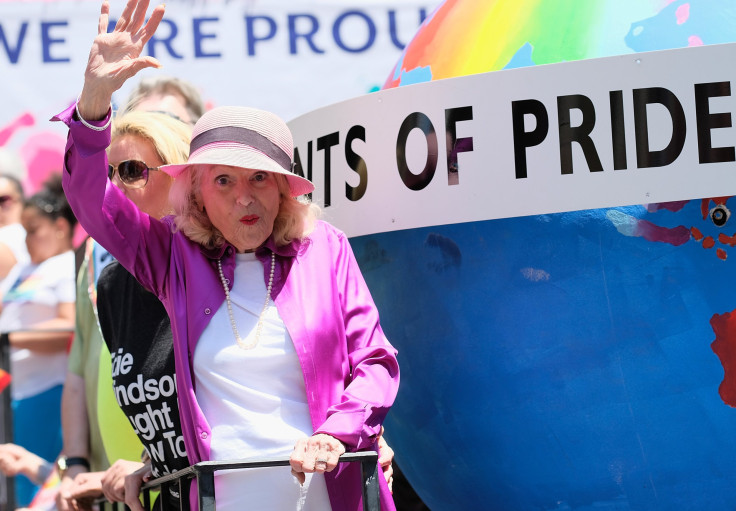Edith Windsor, Gay Rights Pioneer Dies At 88, Twitter Mourns The Loss

Edith Windsor, the gay rights pioneer, and plaintiff in the 2013 landmark case that led the Supreme Court to strike down a federal law — that defined marriage as only between a man and a woman — died Tuesday at the age of 88. The case granted same-sex married couples federal recognition for the first time in the country and the rights that were earlier enjoyed only by married heterosexuals.
Windsor died in Manhattan, New York. Her second wife, Judith Kasen-Windsor, confirmed her death to the New York Times. However, she did not mention the cause of the death. She was said to have been struggling with heart issues for the past few years. Judith and Windsor had been married since 2016. "I lost my beloved spouse Edie, and the world lost a tiny but tough as nails fighter for freedom, justice, and equality," Kasen said in a statement through the LGBT Center of New York City, according to the New York Daily News.
"Edie was the light of my life. She will always be the light for the LGBTQ community which she loved so much and which loved her right back," she added.
After the news of her death broke, tributes kept pouring in on social media as celebrities, politicians, LGBTQ rights advocates, and other social media users offered mourned the loss.
Former President Barack Obama said in a statement: "America's long journey towards equality has been guided by countless small acts of persistence and fuelled by the stubborn willingness of quiet heroes to speak out for what's right."
"Few were as small in stature as Edie Windsor — and few made as big a difference to America."
President Obama issues statement on passing of Edith Windsor: pic.twitter.com/jhNJDdgRSj
— NBC Politics (@NBCPolitics) September 12, 2017
Former first lady Hillary Clinton wrote on Twitter: "Edie Windsor showed the world that love can be a powerful force for change. She will be greatly missed." Her husband and former President Bill Clinton, talk show host Andy Cohen, and politician Andrew Cuomo also expressed sorrow over the gay rights trailblazer’s death on Twitter.
Heartbroken to learn of the passing of my friend Edie Windsor.
— Archive: Governor Andrew Cuomo (@NYGovCuomo) September 12, 2017
Fight for what is right and change the world.https://t.co/aUEo7rkIJQ
The arc of the moral universe bends toward justice. But sometimes it needs a good kick in the ass from people like Edie Windsor.
— Mayor Eric Adams (@NYCMayor) September 12, 2017
In standing up for herself, Edie also stood up for millions of Americans and their rights. May she rest in peace. https://t.co/9nNazdmnPP
— Bill Clinton (@BillClinton) September 12, 2017
Very sad to read of Edith Windsor's passing. Our world is better for her life. Keeping her wife Judith, all her family & friends in my heart https://t.co/K3HebHZhyb
— Chelsea Clinton (@ChelseaClinton) September 12, 2017
Rest in peace Edith Windsor. We'll be grateful to you for the rest of our lives... https://t.co/RvisofSlBB
— Andy Cohen (@Andy) September 12, 2017
Rest in peace, Edie Windsor. Thank you for paving the way. pic.twitter.com/KRLjCWdcqx
— ACLU (@ACLU) September 12, 2017
Today we lost a giant in the fight for LGBTQ rights. Rest in peace, Edie. https://t.co/P41CnSoVOp
— LGBTQ Victory Fund (@VictoryFund) September 12, 2017
Born Edith Schlain in Philadelphia on June 20, 1929, Windsor was the youngest of three children of James and Celia Schlain, who were Jewish immigrants from Russia. The family had struggled to survive poverty during the Great Depression.
Four decades after the 1969 Stonewall Inn uprising, which provided a beginning the fight for lesbian, gay, bisexual and transgender rights in the United States, Windsor — then a widow of a woman, Thea Spyer, with whom she had lived much of her life — became the lead plaintiff in the legal challenge to the Defense Marriage Act in 2013. The case is considered to be one of the most important Supreme Court rulings in the national struggle over the same-sex marriage rights.
United States v. Windsor, the civil rights case, made it to the Supreme Court in 2013, when the apex court ruled that Section 3 of the Defense of Marriage Act — which stated the legal designation of "spouse" only applies to marriages between a woman and a man — was unconstitutional, the New York Times reported.
This ruling paved the way for other court rulings that helped increase the rights of same-sex couples. In 2015, another crucial Supreme Court ruling legalized same-sex marriage nationwide. On the day of the 2015 ruling, Windsor threw a celebratory party. "I’m thrilled, I’m absolutely thrilled," she told the New Yorker as guests crowded her apartment. But she added: "I think it’s only the next major step. We have a history: beginning to see each other with Stonewall when a whole new community began to recognize itself."
© Copyright IBTimes 2024. All rights reserved.












